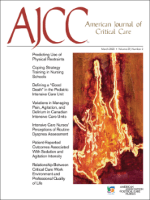
AMERICAN JOURNAL OF CRITICAL CARE
Scope & Guideline
Empowering practitioners with cutting-edge knowledge.
Introduction
Aims and Scopes
- Patient-Centered Care:
The journal emphasizes the importance of patient-centered approaches in critical care, exploring ways to enhance patient experiences and outcomes through individualized care strategies. - Interprofessional Collaboration:
A key focus is on fostering collaboration among healthcare professionals, addressing the complexities of critical care that require a multidisciplinary approach for effective patient management. - Innovative Technologies and Methodologies:
The journal highlights research on emerging technologies, such as telehealth, artificial intelligence, and simulation training, that can improve critical care practices and patient outcomes. - Quality Improvement and Evidence-Based Practice:
There is a consistent emphasis on quality improvement initiatives and the application of evidence-based practices to optimize care delivery in intensive care settings. - Psychosocial Aspects of Care:
The journal also addresses the psychosocial dimensions of critical care, focusing on mental health, family dynamics, and ethical considerations that arise in high-stress environments.
Trending and Emerging
- Integration of Technology in Care:
There is a growing trend towards researching the integration of advanced technologies, including telehealth and artificial intelligence, to enhance patient monitoring and care delivery in critical care settings. - Focus on Mental Health and Well-Being:
Emerging themes include a heightened focus on the mental health of both patients and healthcare providers, particularly in the context of the COVID-19 pandemic, emphasizing resilience and coping strategies. - Palliative Care Approaches:
An increasing number of studies are addressing palliative care practices within critical care, exploring how to provide compassionate care and improve quality of life for patients facing severe illness. - Family Engagement and Support:
Research is increasingly focusing on the role of family engagement in patient recovery, recognizing the importance of supporting family members during the critical care process. - Quality Improvement Initiatives:
There is a noticeable increase in studies aimed at quality improvement within intensive care units, demonstrating a commitment to enhancing patient safety and care outcomes through systematic approaches.
Declining or Waning
- Traditional Clinical Skills Training:
There appears to be a waning emphasis on traditional clinical skills training, as the focus shifts towards integrating technology and innovative methods for skill enhancement. - Generalized Pain Management Approaches:
While pain management remains a critical aspect of care, the specificity and complexity of pain management strategies for critically ill patients seem to be less frequently addressed, indicating a potential shift towards more individualized approaches. - Basic Research on Common Conditions:
Research on common conditions such as basic respiratory distress or sepsis has seen a decline, possibly due to the saturation of existing literature and a move towards more nuanced and specialized studies. - Single-Focus Studies:
There is a noticeable reduction in studies that focus solely on a single aspect of care, as the trend leans towards comprehensive studies that address multiple dimensions of patient care.
Similar Journals
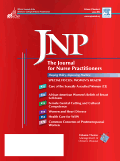
JNP- The Journal for Nurse Practitioners
Championing the Future of Nursing with Scholarly Excellence.JNP - The Journal for Nurse Practitioners is a leading publication in the fields of Advanced and Specialized Nursing, as well as Fundamentals and Skills, proudly published by Elsevier Science Inc. With an ISSN of 1555-4155 and an E-ISSN of 1878-058X, this journal provides a robust platform for disseminating innovative research and clinical insights relevant to nurse practitioners. With a respectable 2023 Scopus ranking placing it in the Q2 category for several key nursing disciplines, JNP serves as an essential resource for professionals seeking to stay at the forefront of nursing practice. The journal spans over a decade of impactful scholarship, converging years from 2005 to 2024, encouraging the advancement of knowledge and skills within the nursing community. Although currently not an open-access publication, it remains pivotal for researchers and practitioners dedicated to improving patient care and advocating for the nursing profession.
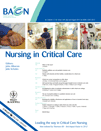
Nursing in Critical Care
Championing the evolution of nursing practices in high-stakes environments.Nursing in Critical Care is a premier journal dedicated to the advancement of knowledge and practice in the field of critical care nursing. Published by WILEY, this esteemed journal has established itself as a leader in the domain, holding a prestigious Q1 ranking in Critical Care Nursing as of 2023, and ranking as the 2nd out of 27 in its category according to Scopus, with an impressive 94th percentile. Since its inception in 1996, it has been an essential platform for disseminating cutting-edge research, evidence-based practices, and critical insights that directly impact patient outcomes in high-stakes environments. While not an Open Access journal, it offers accessible options for institutions and individuals dedicated to the continuous evolution of nursing practices in critical care settings. The journal promises to remain at the forefront of the discipline, providing invaluable resources for researchers, practitioners, and students alike who aspire to enhance their expertise and improve the standards of care within intensive health scenarios.
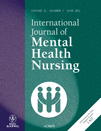
International Journal of Mental Health Nursing
Pioneering insights for the future of mental health nursing.International Journal of Mental Health Nursing is a prestigious peer-reviewed journal published by WILEY, dedicated to advancing the field of mental health nursing. With an ISSN of 1445-8330 and E-ISSN 1447-0349, the journal serves as a vital resource for researchers, clinicians, and educators within the psychiatry and mental health sectors. Ranked in the top Q1 quartile and recognized as Rank #4 out of 45 in the Nursing - Psychiatric Mental Health category, it boasts an impressive 92nd percentile ranking in Scopus metrics, underscoring its influence and reach within the academic community. Emphasizing original research, systematic reviews, and innovative clinical practices, the journal aims to bridge the gap between theory and practice, ultimately enhancing mental health care. The journal’s commitment to disseminating high-quality research ensures that it is an essential publication for anyone engaged in the evolving landscape of mental health nursing.
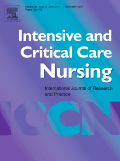
Intensive and Critical Care Nursing
Leading the way in critical care nursing excellence.Intensive and Critical Care Nursing is a premier peer-reviewed journal published by Elsevier Science Ltd, dedicated to advancing the field of critical care nursing through high-quality research, innovative practice, and critical analysis. With an impressive impact factor, this journal is recognized as a leading resource in Critical Care Nursing, holding the esteemed Q1 quartile designation and ranking first among 27 journals in its category, placing it at the 98th percentile. Since its inception in 1992, the journal has been committed to fostering an interdisciplinary dialogue among researchers, clinicians, and educators, ultimately aiming to improve patient outcomes in critical care settings. While currently not offering open access options, the journal is highly accessible through leading academic databases, ensuring that cutting-edge research reaches its intended audience. Explore the latest findings and developments in critical care nursing that shape and influence practice across the globe.
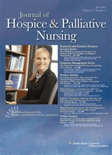
Journal of Hospice & Palliative Nursing
Empowering Care, Enhancing Lives.The Journal of Hospice & Palliative Nursing (ISSN: 1522-2179, E-ISSN: 1539-0705), published by Lippincott Williams & Wilkins, stands as a leading resource in the field of hospice and palliative care nursing. With an impressive impact factor and ranked in the Q1 quartile for Advanced and Specialized Nursing and Q2 quartile for Community and Home Care as of 2023, this journal serves as a critical platform for disseminating evidence-based practices and innovative research. It covers a broad spectrum of topics, aiming to improve patient experiences and enhance the quality of care for individuals with life-limiting conditions. Created to support healthcare professionals, researchers, and students in the United States and beyond, the journal invites contributions that stimulate scholarly dialogue and advance the practice of palliative nursing. With publication years converging from 1999 to 2024, it remains an invaluable asset to the nursing community, fostering advancements in this vital area of healthcare.
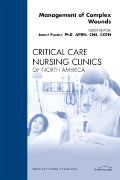
Critical Care Nursing Clinics of North America
Transforming Insights into Exceptional Patient Care.Critical Care Nursing Clinics of North America, published by W B Saunders Co-Elsevier Inc, stands as a leading journal in the field of critical care nursing, showcasing groundbreaking research and essential clinical practices since its inception in 1989. With an ISSN of 0899-5885 and an E-ISSN of 1558-3481, this quarterly publication has earned its reputation within the Q2 category of critical care nursing, ranking 13th out of 27 in the Scopus metrics. Its contributions significantly aid healthcare professionals in enhancing patient outcomes in critical settings through the dissemination of evidence-based knowledge, innovative approaches, and expert insights. Although it does not offer an Open Access model, the journal remains dedicated to serving researchers, practitioners, and students in understanding advancements and best practices within this dynamic specialty, with a focus on improving the quality of care in critical nursing environments.
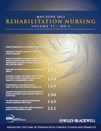
Rehabilitation Nursing
Shaping the future of rehabilitation through scholarly excellence.Rehabilitation Nursing, published by Lippincott Williams & Wilkins, is an esteemed journal dedicated to advancing the fields of rehabilitation, nursing, and physical therapy. With an ISSN of 0278-4807 and an E-ISSN of 2048-7940, this journal has been a crucial resource for practitioners and researchers since its inception in 1975, continuously providing insights through its convergence of scholarship up to 2024. As a member of the Q3 category in multiple disciplines, including Medicine (Miscellaneous), Nursing (Miscellaneous), and Physical Therapy, the journal affirms its relevance within the academic community, particularly highlighted by its Scopus rankings. With a focus on disseminating innovative research, clinical findings, and evidence-based practices, Rehabilitation Nursing aims to enhance patient care and foster improvements in rehabilitation strategies. Whether one seeks to stay abreast of the latest developments or contribute new insights, this journal is a must-read for those involved in the fields of rehabilitation and nursing.
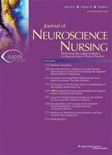
JOURNAL OF NEUROSCIENCE NURSING
Fostering Scholarly Discourse in Neuroscience and NursingJournal of Neuroscience Nursing, published by Lippincott Williams & Wilkins, stands as a pivotal resource within the interdisciplinary field of neuroscience and nursing. With an ISSN of 0888-0395 and E-ISSN of 1945-2810, this journal has been dedicated to advancing knowledge and practice in neuroscience nursing since its inception in 1986. It aims to provide a platform for the dissemination of significant research, clinical guidelines, and innovative care strategies that shape the future of nursing in the neurological domain. The journal is recognized in various categories, achieving a Q1 ranking in Medical and Surgical Nursing and a Q3 ranking in Neurology (Clinical) as of 2023, highlighting its influence and relevance in the medical community. Although it does not operate on an open-access model, the journal's commitment to quality is evidenced by its strong Scopus rankings, including a notable rank of #3 out of 26 in Nursing - Medical and Surgical Nursing, reflecting its vital role in fostering scholarly discourse. Located in Philadelphia, PA, the Journal of Neuroscience Nursing is an essential publication for researchers, practitioners, and students dedicated to improving patient outcomes and advancing the field of neuroscience nursing.
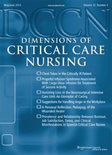
Dimensions of Critical Care Nursing
Transforming Critical Care Through Multidisciplinary CollaborationDimensions of Critical Care Nursing, published by Lippincott Williams & Wilkins, is a premier journal dedicated to advancing the knowledge and practices within the fields of critical care and emergency nursing. With a distinguished history dating back to 1982, this journal plays a vital role in disseminating cutting-edge research, clinical advancements, and educational resources aimed at enhancing patient care in high-stakes environments. The journal is ranked in the Q2 quartile for both Critical Care Nursing and Emergency Nursing, reflecting its significant impact on the nursing field, with Scopus rankings placing it at #11 in Critical Care Nursing and #14 in Emergency Nursing. Targeting a multidisciplinary audience of researchers, clinicians, and students, the journal serves as a critical platform for discussions surrounding innovative patient care strategies, evidence-based practices, and emerging trends in critical nursing. Although it is not an open-access journal, it provides valuable insights that are essential for shaping the future of nursing practice. Stay informed on the latest research and contribute to the evolving landscape of critical and emergency care through Dimensions of Critical Care Nursing.

Journal of Pediatric Hematology-Oncology Nursing
Innovating pediatric nursing through shared knowledge and research.The Journal of Pediatric Hematology-Oncology Nursing, published by SAGE Publications Inc, serves as a premier platform for advancing the field of pediatric nursing, particularly in the critical realms of hematology and oncology. With an ISSN of 2752-7530 and an E-ISSN of 2752-7549, this journal has quickly established its significance, achieving commendable rank status in various nursing specialties, including a Q1 placement in Advanced and Specialized Nursing as of 2023. It provides critical insights and evidence-based research across its converged years from 2022 to 2024, ensuring that professionals in the field remain at the forefront of best practices and innovations. The journal is especially relevant for nurses, medical professionals, and researchers aiming to improve patient outcomes in pediatric care. With open access options, it invites a broad readership to engage with its content, thus fostering collaboration and knowledge sharing in this vital area of healthcare.